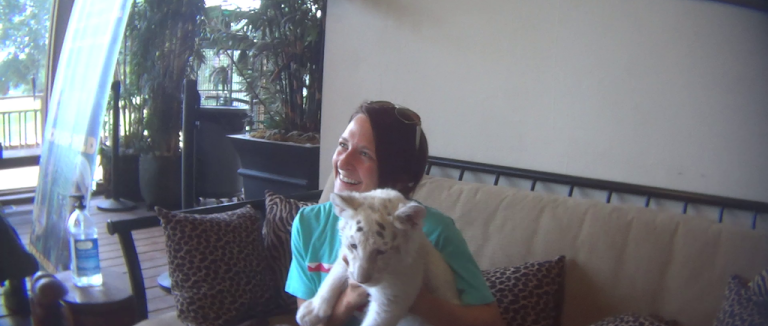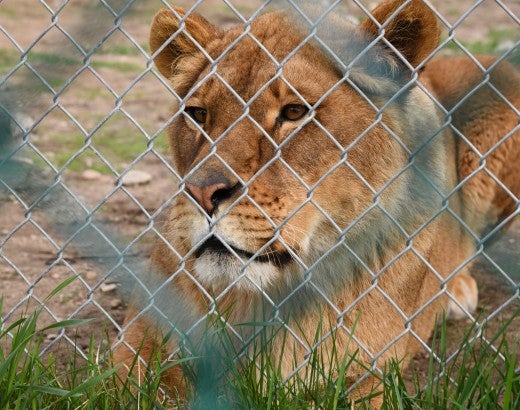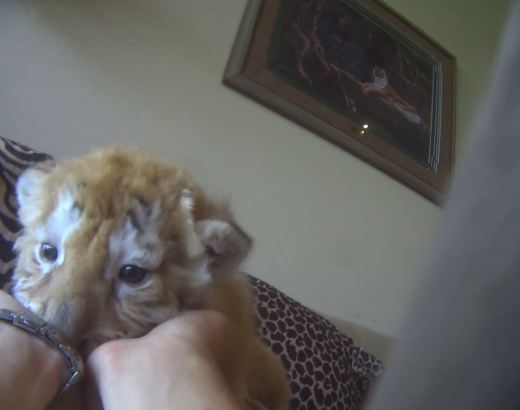An Indiana roadside zoo whose owner’s federal license was revoked for numerous violations of the Animal Welfare Act, including beating a leopard to death with a baseball bat and swinging monkeys around by their tails, has closed its doors. The animals are being moved to facilities where they will hopefully receive better care.
Today is the deadline for the Indianapolis Zoo to remove and transport to other institutions more than 200 wild animals from the Wildlife in Need roadside zoo owned by Tim Stark. An Indiana judge ordered the removal, and this week a warrant was issued for Stark’s arrest after evidence surfaced that he hid animals from inspectors, including a sloth, two Debrazza monkeys and three macaques. Authorities discovered the animals in a sweltering box truck without ventilation or drinking water.
Stark, a serial animal abuser according to U.S. Department of Agriculture records, is an associate of the incarcerated Oklahoma roadside zoo owner Joe Exotic a.k.a Joseph Maldonado-Passage. He was also recently seen in Netflix’s “Tiger King.” Stark sent at least one cougar and one bear to Maldonado-Passage and received numerous animals from him, including a tiger, a lion, a liliger and liger cubs.
Stark has long been on our radar, along with the owners of dozens of other shoddy operations that keep wild animals, including big cats, in small, confined spaces, mistreat them and exploit them for profit. Much like Maldonado-Passage, who is serving 20 years in prison for killing five tigers and plotting the murder of a big cat sanctuary owner, Stark operated under false pretenses. He claimed he was running a nonprofit animal rescue and rehabilitation facility and solicited public donations. In fact, he was exploiting the animals, including tiger cubs, by offering them to visitors for close encounters—a cruel and exploitative practice that disregards both the animals’ well-being and public safety.
One of Stark’s offerings was the infamous “baby tiger playtime” when cubs, ripped from their mothers at birth, were paraded in front of customers who paid to pet, handle and play with them. The cubs’ lives revolved around these photo ops, irrespective of how tired, overheated, thirsty or hungry they were. If they resisted, they were hit in the face with riding crops and dragged by their legs.
Stark’s misdeeds finally caught up with him. Earlier this year, the USDA revoked Stark’s exhibitor license and assessed a $340,000 civil penalty. Despite Stark's chronic history of neglect and abuse, the agency did not remove any animals. Soon after, the Indiana attorney general filed a lawsuit against his roadside zoo, alleging the facility deceived consumers who made donations while keeping animals in deplorable conditions.
Altogether, more than 120 charges were filed against Stark and Wildlife in Need. These included lack of veterinary care for sick and dying animals, including at least 12 exotic cats who did not receive any pain medication after they were declawed in violation of the Animal Welfare Act; multiple unexplained animal deaths, including an ocelot who was apparently strangled; and unsafe enclosures. Stark also hid two declawed five-week-old tiger cubs from inspectors who later discovered the animals in severe pain with swollen paws and open, bloody wounds.
According to the initial complaint filed by the attorney general, hundreds of animals at the roadside zoo were harmed, abused and died of disease. “Hundreds of animals live in cages that are nearly impossible for staff members to properly clean. In many instances, 1-3 employees have been left to care for over 300 animals."
As sad as this story is, sagas similar to Tim Stark’s have played out multiple times in Indiana, and after each case the state is left holding the bag to find placement for dozens of animals. Indiana has weak laws that allow roadside zoos to operate with impunity, and it’s time lawmakers there act to strengthen them.
We are also pushing to pass the Big Cat Public Safety Act in Congress to end public contact with big cats all over the United States. Roadside zoos are a public safety hazard and a burden on animal protection organizations and sanctuaries that are often called upon to take in these animals when those who run these facilities don’t want them anymore or are shut down by authorities at taxpayer expense. We need our lawmakers to work swiftly to end this terrible animal welfare problem that has persisted for too long.
Sara Amundson is president of the Humane Society Legislative Fund.



